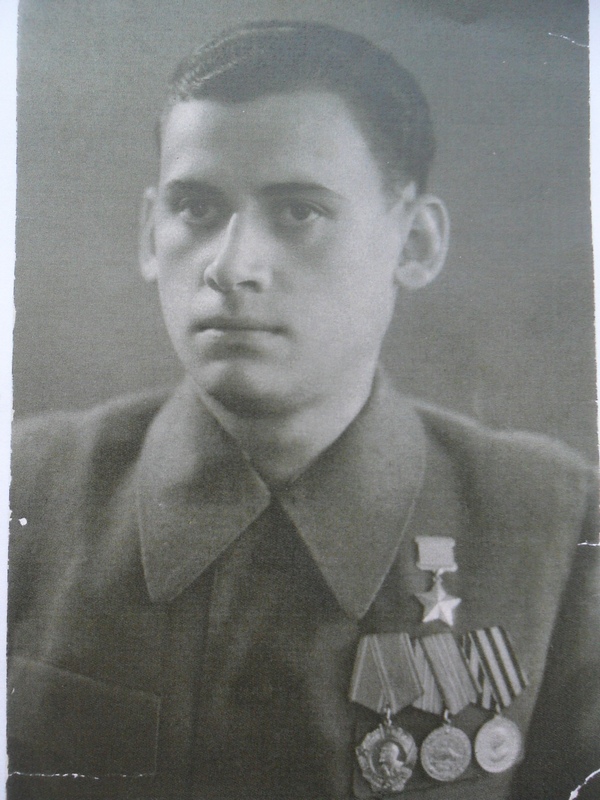Lev Gitman was born in 1922 in Iekaterinoslav, later Dnepropetrovsk (now Dnipro), Ukraine in the family of a Jewish worker. He studied at a Soviet school, then worked as a metal-fitter at a factory. Since Gitman suffered from serious chronic pleurisy, he was not subject to military conscription. However, with the start of the Soviet-German war in June 1941, Gitman declared that he had lost his military ID, concealed the fact of his being ill, and was drafted into the Red Army as a scout.
In 1942, Gitman fought in the North Caucasus, later he was transferred to Ukraine. On the night of September 26, 1943, as part of a reconnaissance group of 18 men, he forced the Dnieper River above the city of Dnepropetrovsk. After quietly eliminated a German outpost, the scouts managed to penetrate deep into enemy territory and capture a bridgehead on the west bank of the Dnieper. In the morning, the Germans discovered the Soviet scouts. In the ensuing battle, which lasted more than four hours, Gitman personally killed several enemy soldiers, but was seriously injured. Only seven of the eighteen scouts survived, but they were able to hold the bridgehead until reinforcements arrived. The bridgehead enabled two Red Army divisions to force the river following the valiant reconnaissance group. All the participants of this operation, including Gitman, were awarded both the title of Hero of the Soviet Union and the Order of Lenin.
However, following his injury, Gitman's pleurisy revived. While in a military hospital, he was declared invalid and dismissed from the army.
The commander of the 496th Intelligence Company and, also, of the reconnaissance group that forced the Dnieper on the night of September 26, 1943, Captain Sergei Shpakovskii (a Ukrainian) recalled Lev Gitman thus:
"He was a golden fellow, warm-hearted, and modest. We … served in the same company. Before one of the battles, I asked Lev whether he was afraid of going into combat. "Like everyone else" he said . "Everyone wants to live." He never bragged, as some do, but he was among the first to climb out of a trench during an attack. …. That's how I remember Sergeant Gitman a real fighter. The news of the terrible tragedy of Babii Iar and the gas chambers, where the Nazis suffocated millions of people, did not allow this fellow any rest. He was eager to get to Berlin as soon as possible and to get hold of Hitler. ... "
Perhaps one can forgive Captain Shpakovskii both for his provocative question (whether the Jew Gitman was afraid) and for his failure to mention who were the people suffocated in the gas chambers since in these two ways the captain was a son of his time.
After his dismissal from the army, Gitman worked as a teacher of manual arts at schools in Dnepropetrovsk. Under his guidance, pupils made various practical things out of metal in the school workshop. Gitman allowed them to take their work home but in 1958 he was suddenly accused of "theft of state property" worth 86 rubles and 70 kopecks (in 1958, this was the price of three kilogram butter or of a pair of cheap men's shoes) and put on trial. The court of first instance did not find any evidence, but the authorities ordered that the case be continued. The court of second instance sentenced him to ten years imprisonment. Furthermore, the court deprived Gitman of the title of Hero of the Soviet Union and of other awards.
This took place not under Stalin, but during the period of "economic trials" that were carried out under Khrushchev, Stalin's "liberal" successor. The majority of the victims of such trials were Jewish. The campaign for Gitman's rehabilitation conducted by other veterans and by his wife was only partly successful: in 1961, Gitman was pardoned, but his military awards were not returned to him.
In 1979, Gitman died at the age of 56. According to his wife, his last words were "Death is not terrible. What is terrible is that I am passing away dishonored."







